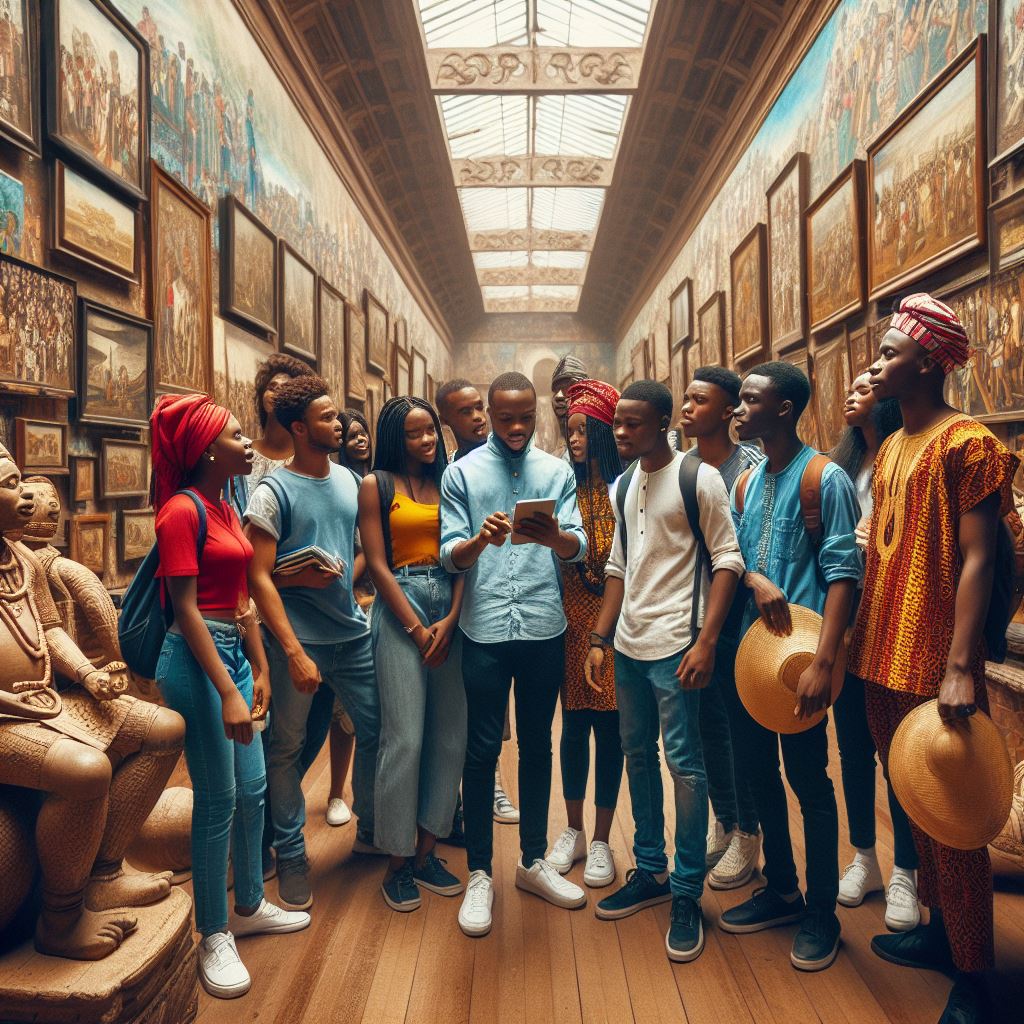Introduction
A. Overview of Nigeria’s Tourism Industry
Nigeria, a diverse nation, boasts captivating tourism hotspots. From vibrant cities to serene landscapes, its tourism industry reflects rich cultural heritage.
B. Importance of Studying Nigeria’s Tourism Hotspots
- Economic Impact: Tourism contributes significantly to Nigeria’s economy, fostering growth and job creation.
- Cultural Exchange: Understanding tourist hotspots enhances cultural exchange and global awareness.
- Sustainable Development: Studying these areas helps promote sustainable tourism practices, preserving natural and cultural treasures.
C. Study Module Overview
- Purpose: This module dives into Nigeria’s tourism gems, unraveling their cultural and economic significance.
- Structure: Expect in-depth analyses, case studies, and practical insights to grasp the dynamics of these hotspots.
- Benefits: By the end, participants will not only appreciate the allure of Nigeria’s tourism but also understand its strategic importance.
Overview of Nigeria’s Tourism Industry
A. Current status and growth potential
Nigeria’s tourism industry is growing rapidly with vast potential for further expansion.
The country offers diverse natural landscapes, cultural heritage, and historical sites as attractions.
The government has taken steps to improve infrastructure and promote tourism through campaigns and policies.
Increased international and domestic visitor numbers indicate a positive growth trend in the industry.
The availability of direct flights and visa reforms have made Nigeria more accessible to tourists.
B. Contribution to the economy
Tourism plays a significant role in Nigeria’s economy by generating revenue and creating employment opportunities.
It contributes to the country’s GDP, foreign exchange earnings, and helps diversify the economy.
The sector supports various related industries such as hospitality, transportation, and handicrafts.
The government recognizes the potential of tourism to drive economic growth and has implemented policies to support its development.
Investments in infrastructure and human capital are essential to maximize the economic benefits of tourism.
C. Challenges and opportunities
Despite the industry’s growth potential, Nigeria faces several challenges in developing its tourism sector.
Inadequate infrastructure, security concerns, and negative perceptions affect the industry’s growth and image.
Improving infrastructure and enhancing security are crucial areas that need attention for sustainable tourism growth.
Collaboration between the government, private sector, and local communities is vital for overcoming these challenges.
The government should focus on sustainable tourism practices, community involvement, and marketing strategies to attract more tourists.
Nigeria’s diverse cultural heritage, festivals, and wildlife provide opportunities for niche tourism markets and product development.
Stakeholders need to invest in skills training, marketing campaigns, and promoting Nigeria’s unique attractions globally.
In summary, Nigeria’s tourism industry has vast growth potential and can significantly contribute to the country’s economy.
The government’s efforts to improve infrastructure, promote tourism, and implement supportive policies are encouraging.
However, challenges such as inadequate infrastructure, security concerns, and negative perceptions need to be addressed.
With collaborative efforts and a focus on sustainable practices, Nigeria can overcome these challenges and tap into niche tourism markets.
Investments in skills training, marketing, and product development will be instrumental in attracting more visitors and maximizing the economic benefits of tourism.
Read: Impact of Nigerian Culture on Industrial Relations Practices
Major Tourism Hotspots in Nigeria
1. Lagos
With its diverse range of attractions and activities, Nigeria offers tourists a unique and enriching travel experience.
Lagos, the country’s largest city, is a bustling metropolis that attracts visitors with its vibrant atmosphere and numerous tourist sites.
From historical landmarks like the National Museum Lagos to stunning beaches such as Tarkwa Bay, Lagos has something for everyone.
Additionally, cultural enthusiasts can explore the local markets, showcasing Nigerian arts, crafts, and traditional attire.
2. Abuja
Abuja, the capital city of Nigeria, is another must-visit destination.
The city is known for its modern architecture, exemplified by the Nigerian National Mosque and the Nigerian National Christian Centre.
Visitors can also explore the enchanting Aso Rock, a massive monolith that provides panoramic views of the city.
To truly immerse in Nigerian culture, tourists can attend a traditional Nigerian wedding, which offers a firsthand experience of the country’s customs and traditions.
3. Calabar
Calabar, located in the Cross River State, offers a perfect blend of natural beauty and historical significance.
Tourists can witness breathtaking vistas at the Obudu Mountain Resort or take a refreshing dip in Kwa Falls.
The city is also home to heritage sites such as the Duke Town Church and the Tinapa Business Resort, which showcase Nigeria’s colonial past.
Additionally, Calabar hosts thrilling festivals like the Calabar Carnival, where visitors can witness colorful parades and traditional performances.
4. Jos
Jos, situated in the Plateau State, is a paradise for adventure enthusiasts.
The city’s picturesque landscape provides ample opportunities for hiking, rock climbing, and exploring beautiful waterfalls like the Assop Falls.
Visitors can delve into the region’s rich cultural heritage by visiting the Jos Museum or the National Museum of Nigeria.
Accommodation options range from budget-friendly guesthouses to luxury resorts, ensuring a comfortable stay for every traveler.
Transform Your Career with Expert Guidance
Get personalized mentorship consulting that’s tailored to your unique path. Our expert advice is actionable and exclusive.
Get StartedIn essence, Nigeria’s major tourism hotspots offer a diverse range of attractions and experiences for tourists to explore.
Whether it’s the vibrant city life of Lagos, the modern architecture of Abuja, the natural wonders of Calabar, or the adventure activities in Jos, Nigeria has something for every traveler.
With recommended accommodations and a rich cultural heritage, Nigeria is emerging as a top tourist destination in West Africa.
So, pack your bags and get ready to experience the beauty and hospitality of Nigeria’s tourism hotspots.
Read: Alumni Tales: Success Stories from Nigerian Graduates
Lesser-Known Tourism Gems in Nigeria
Visiting Nigeria’s tourism hotspots has always been a popular choice among travelers.
However, there are several lesser-known gems in the country that are equally captivating and worth exploring.
In this section, we will delve into some of these hidden treasures that offer unique experiences and showcase Nigeria’s cultural and natural diversity.
A. Osun-Osogbo Sacred Grove
First on our list is the Osun-Osogbo Sacred Grove.
This tranquil haven, recognized as a UNESCO World Heritage Site, juxtaposes spiritual significance with breathtaking artworks.
A stroll through this grove guarantees a spiritual awakening amidst sculptures and shrines.
B. Yankari National Park
Next, we have the magnificent Yankari National Park, situated in Bauchi State.
This expansive park is a paradise for nature enthusiasts.
With its diverse wildlife, visitors can witness elephants, lions, baboons, and over 350 species of birds in their natural habitat.
Additionally, the Wikki Warm Springs – a natural hot spring – offers a refreshing respite for those seeking relaxation.
C. Ogbunike Caves
Moving on, the Ogbunike Caves in Anambra State are a hidden gem waiting to be discovered.
As you navigate through the caves’ labyrinthine tunnels, you’ll be greeted by awe-inspiring rock formations.
The caves hold historical and cultural significance, once serving as a refuge during tribal wars.
D. Zuma Rock
Another must-visit destination is Zuma Rock, located in Niger State.
Known as the “Gateway to Abuja,” this massive monolith rock stands tall and proud.
Its unique geological formation and imposing presence leave visitors in awe.
Zuma Rock is a testament to the beauty of nature and a symbol of Nigeria’s rich heritage.
E. Benin City and its historical sites
Lastly, let’s explore Benin City, the ancient capital of the Benin Kingdom.
This historical city is replete with fascinating landmarks that offer insight into Nigeria’s past.
The Royal Palace, adorned with exquisite architectural details, provides a glimpse into the regal heritage of the Benin Kingdom.
The Bronze Works, famous for their intricate craftsmanship, highlight the artistic prowess of the ancient civilization.
In fact, Nigeria is not just about its popular tourist sites.
The country boasts lesser-known gems that captivate travelers with their unique offerings.
From the spiritual tranquility of Osun-Osogbo Sacred Grove to the raw beauty of Zuma Rock and the rich history of Benin City, these destinations showcase Nigeria’s diverse culture, history, and natural wonders.
So, step off the beaten path and uncover the hidden treasures that lie within Nigeria’s tourism landscape.
Read: Career Opportunities after Studying Labour Relations in Nigeria

Popular Tourism Activities in Nigeria
Nigeria has a diverse range of tourism activities that attract visitors from all over the world.
A. Wildlife safaris and nature exploration
Take a safari tour to Yankari National Park, home to elephants, baboons, and over 350 bird species.
Explore Gashaka Gumti National Park, the largest in Nigeria, known for its diverse wildlife and stunning landscapes.
Visit the Afi Mountain Wildlife Sanctuary to see rare and endangered species such as the Cross River gorilla.
Go bird watching in the Ogbunike Cave, where you can spot various species of birds in their natural habitat.
B. Cultural festivals and traditional ceremonies
Participate in the Durbar festival in Kano, a colorful event featuring horse riding and traditional dances.
Experience the New Yam Festival in Igboland, where locals come together to celebrate the harvest season.
Witness the Eyo festival in Lagos, a vibrant procession of masquerades and traditional music.
Attend the Argungu Fishing Festival, where thousands of fishermen compete to catch the biggest fish.
C. Water sports and beach activities
Go surfing and windsurfing in Tarkwa Bay, known for its beautiful waves and sandy beaches.
Try kayaking and canoeing in the Lagos Lagoon or the Niger River, surrounded by picturesque scenery.
Enjoy jet skiing and parasailing in the Lekki Peninsula, offering stunning views of the Atlantic Ocean.
Relax on the pristine beaches of Calabar, Badagry, and Elegushi, and indulge in beach volleyball and sunbathing.
D. City tours and historical site visits
Explore Lagos, Nigeria’s largest city, and visit iconic landmarks such as the National Museum and Lekki Conservation Centre.
Discover the ancient city of Benin, home to the famous Benin City walls and the Benin National Museum.
Visit the historic town of Ile-Ife, known as the birthplace of the Yoruba civilization and its rich cultural heritage.
Explore Abuja, the capital city, and experience the blend of modern architecture and Nigerian history at the Nigerian National Mosque and Aso Rock.
In short, Nigeria offers a wide range of tourism activities, from wildlife safaris to cultural festivals, water sports, and historical site visits.
Whether you are a nature lover, an adventure seeker, or a history enthusiast, Nigeria has something unique to offer.
Read: Scholarships for Hospitality Studies in Nigeria: A Guide
Challenges and Solutions for Nigeria’s Tourism Industry
A. Infrastructural limitations
Insufficient transportation systems make it difficult for tourists to access remote attractions.
Lack of quality roads, airports, and railways hampers the growth of tourism in Nigeria.
Solution
Investment in infrastructure development is vital to enhance accessibility and attract more tourists.
The government should prioritize the improvement of transportation networks to support tourism growth.
Public-private partnerships can be established to fund and implement infrastructure projects effectively.
B. Safety and security concerns
Nigeria has faced challenges relating to safety and security, which affect tourism development.
High crime rates, including kidnapping and terrorism, deter potential tourists from visiting the country.
Solution
The Nigerian government must enhance security measures and provide a safe environment for tourists.
Establishing specialized tourist police units and increasing surveillance in tourist areas can help ensure safety.
Collaboration with international security agencies and offering safety guidelines to tourists is necessary.
C. Marketing and promotion strategies
Nigeria’s tourism industry lacks effective marketing and promotion strategies to attract domestic and international tourists.
Inadequate advertising and branding efforts result in limited awareness of Nigeria’s tourism potential.
Solution
The government should invest in comprehensive marketing campaigns to showcase Nigeria’s attractions.
Collaborating with travel agencies, airlines, and online platforms can help promote tourism effectively.
Utilizing social media platforms and organizing promotional events can also enhance Nigeria’s tourism visibility.
D. Collaboration with private sector
Limited collaboration between the public and private sectors hinders the growth of Nigeria’s tourism industry.
Insufficient investments from the private sector lead to the underdevelopment of tourist facilities and attractions.
Solution
Encouraging private sector participation through incentives and favorable policies is essential.
Public-private partnerships can be formed to develop and maintain tourist infrastructure and services.
Providing a conducive business environment will attract private investments and boost the tourism sector.
Overall, Nigeria’s tourism industry faces several challenges but can overcome them through strategic interventions.
Improving infrastructure, guaranteeing safety, implementing effective marketing strategies, and promoting collaboration with the private sector are key solutions that can propel Nigeria towards becoming a prominent global tourism destination.
Conclusion
A. Recap of Nigeria’s tourism hotspots
Nigeria is blessed with a diverse range of tourism hotspots, from the mesmerizing wildlife in Yankari National Park to the stunning beaches of Lagos.
Exploring these destinations allows tourists to experience the rich cultural heritage and natural beauty of the country.
B. Importance of studying and promoting tourism in Nigeria
Studying and promoting tourism in Nigeria is crucial for several reasons.
Firstly, it boosts the economy by creating job opportunities and generating revenue.
Additionally, it promotes cultural exchange and understanding among different communities.
Lastly, it helps preserve and showcase Nigeria’s unique heritage to the world.
C. Encouragement for further exploration and research
As we conclude this study module, it is important to encourage further exploration and research on Nigeria’s tourism hotspots.
By delving deeper into these destinations, we can uncover hidden treasures, promote sustainable tourism practices, and enhance the overall tourism experience for visitors.
Nigeria is a country that has much to offer in terms of tourism hotspots.
By studying and promoting these destinations, we can not only boost the economy but also preserve and showcase Nigeria’s rich cultural and natural heritage for future generations.




